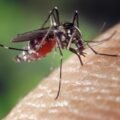New U.S. Army-funded research published in the Proceedings of the National Academy of Sciences reveals gene-editing techniques can be used as a means of pest control to help reduce the spread of infectious diseases commonly transmitted by mosquitoes, such as Zika or West Nile Virus.
Researchers from the Army’s Institute for Collaborative Biotechnologies, in collaboration with the University of California Santa Barbara, say they could target a specific gene that would render male mosquitoes infertile by using a gene-editing tool called CRISPR-Cas9.
Using a method called “sterile insect technique,” large numbers of sterile male insects can be released into the wild to overwhelm their fertile male counterparts. When a female mates with a sterile male, the female insect then becomes infertile, resulting in a significant decrease in the next generation’s population.


In the past, the sterile insect technique has been used to effectively manage agricultural pests, such as the Mediterranean fruit fly. However, similar techniques applied to the disease-spreading Aedes aegypti mosquito, or “yellow fever mosquito,” have been largely unsuccessful.
The problem lies in the common practice of using chemicals or radiation to sterilize insects for population control. While successful on other insects, the chemical techniques can be detrimental to mosquitos’ health, thus impairing the sterile males’ ability to mate.
In hopes of finding a solution with less “collateral damage,” researchers decided to turn to the unique genome editing tool, CRISPR-Cas9.
First introduced in 2002, CRISPR-Cas9 has opened the door for geneticists and medical researchers to conduct faster, cheaper, and more accurate genome editing by allowing for highly targeted and rapid modification of DNA in a genome.
“When CRISPR-Cas9 came out several years ago it just offered new opportunities to do things that you couldn’t do before,” said Dr. Craig Montell, a distinguished professor at UC Santa Barbara and study co-author. “So, the time seemed right to for us to start working on Aedes aegypti.”


Using CRISPR-Cas9, researchers found they were able to create “mutant” Aedes aegypti mosquitoes, which produced no sperm, but were otherwise perfectly healthy.
Researchers confirmed that females who initially mated with one of their genetically modified males were rendered infertile by testing the mutant males against a group of their wild counterparts.
“Essentially, all of the females remained sterile,” Dr. Montell said in a press release by Army Research Lab. “This confirmed that males could suppress female fertility without producing sperm.”
Researchers said introducing the sterile male mosquitoes for four hours reduced female fertility by around 20%. After eight hours, the population numbers began to level off at about 10%.
According to Dr. Montell, mosquito populations can quickly bounce back from an 80% drop in fertility, so successful use of the sterile insect technique for pest control will require successive releases of sterile males to the population.
Researchers say they plan to continue investigating mosquito mating behaviors and fertility in hopes of suppressing mosquito populations to help control the spread of deadly viruses and diseases.
“We’ve become very interested in studying many aspects of behavior in Aedes aegypti because these mosquitoes impact the health of so many people,” said Dr. Montell. “There is a pandemic every year from mosquito-borne diseases.”
Follow and connect with author Tim McMillan on Twitter: @LtTimMcMillan or encrypted email: LtTimMcMillan@protonmail.com
